MercoPress. South Atlantic News Agency
Tag: Workers' Party (Brazil)
-
Friday, April 6th 2018 - 07:47 UTC
Lula expected to continue campaigning from jail as the Workers Party readies a Plan B and option candidate
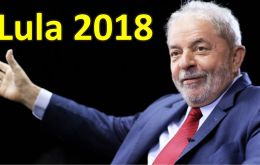
Even when Brazilian ex president Lula da Silva was described as facing Judge Sergio Moro's Friday jailing decision calmly, the big question now is what follows for the presidential candidate and the Workers Party chances ahead of the coming October presidential election.
-
Friday, April 6th 2018 - 07:28 UTC
Lula has until Friday afternoon to start a prison sentence for corruption
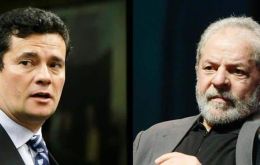
Former president Luiz Inacio Lula da Silva, front runner in Brazil’s October presidential elections, was given 24 hours on Thursday to surrender to police and start a 12-year prison sentence for corruption. The timing of the order from Judge Sergio Moro, head of Brazil’s huge “Car Wash” anti-graft probe, took Lula’s lawyers by complete surprise. They had been expecting to use legal maneuvers to delay the start of prison at least until next week.
-
Friday, January 26th 2018 - 07:21 UTC
Lula challenges court and accepts nomination as presidential pre-candidate

Brazilian ex-head of state Lula da Silva agreed on Thursday to represent the opposition Workers’ Party (PT) in this year’s presidential election, although a corruption conviction makes it unclear whether he will be able to run.
-
Wednesday, January 24th 2018 - 07:31 UTC
Lula supporters will launch his presidential candidacy whatever a court decides on the bribe conviction

Brazilian politicians, voters and investors will find out this Wednesday whether an appeals court will allow the country’s popular leader, Lula da Silva, to run for president this year after being found guilty of accepting a bribe.
-
Friday, January 19th 2018 - 09:01 UTC
Lula is no radical or a threat to stability: everyone won when he was president

The leader of Brazil's Workers' Party, PT, argued in an interview that former president Luiz Inacio Lula da Silva is anything but radical and does not pose a threat to Brazilian financial stability. Brazilian senator Gleisi Hoffman told Bloomberg News that Lula is working on a second “letter to Brazilian people” (as he did in 2002) to reassure the markets about his commitment to fiscal responsibility.
-
Friday, November 3rd 2017 - 07:08 UTC
Brazilian electorate divided on Lula: half want him as president and the other half in jail

Half of Brazilians want former President Lula da Silva to win next year's election and return to the office he occupied between 2003 and 2010. The other half wants him in prison for a corruption conviction.
-
Thursday, September 7th 2017 - 08:11 UTC
Top prosecutor accuses Lula and Dilma of forming a criminal organization
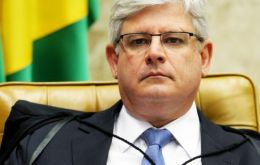
Brazil’s top prosecutor on Tuesday charged former Presidents Lula da Silva and Dilma Rousseff along with fellow Workers Party members with forming a criminal organization, the latest accusations in Brazil’s sprawling corruption scandal
-
Wednesday, July 12th 2017 - 18:27 UTC
Brazil: Former President Lula da Silva found guilty of corruption

Former Brazilian leader Luiz Inacio Lula da Silva, who rose from childhood poverty to become a two-term president, was convicted on corruption charges on Wednesday in the first of five graft trials he faces.He was sentenced to nine and a half years in prison. He will remain free on appeal.
-
Wednesday, July 12th 2017 - 06:38 UTC
Boost for Temer: Congress approves overhaul of Brazil's labor laws
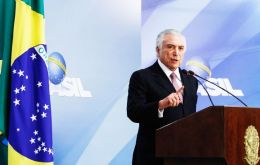
The Brazilian Senate gave final congressional approval to an unpopular overhaul of the country's labor laws on Tuesday night, providing crucial political support to embattled President Michel Temer as he fights a damaging corruption accusation.
-
Thursday, May 25th 2017 - 20:45 UTC
Brazilian ex presidents discussing the outcome of the political situation
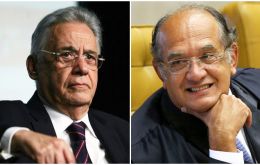
Three ex Brazilian presidents are holding talks on the future of the country following what seems the inevitable outcome of the current political situation with deep differences between the political system and the Judiciary.
